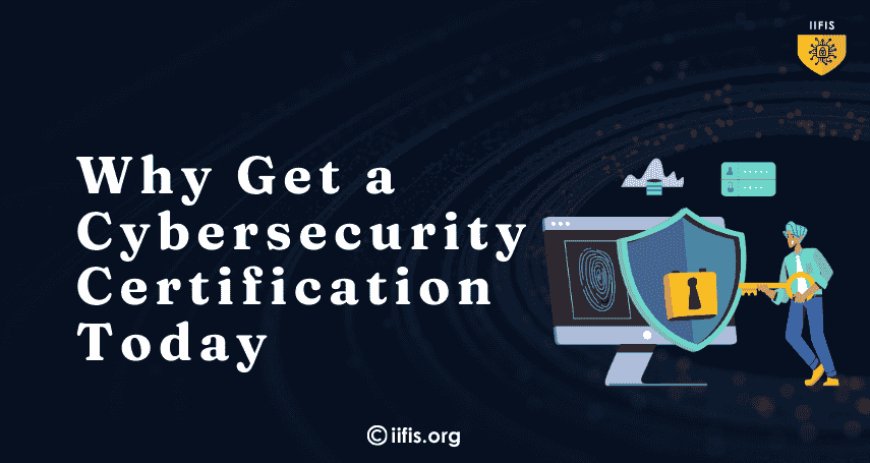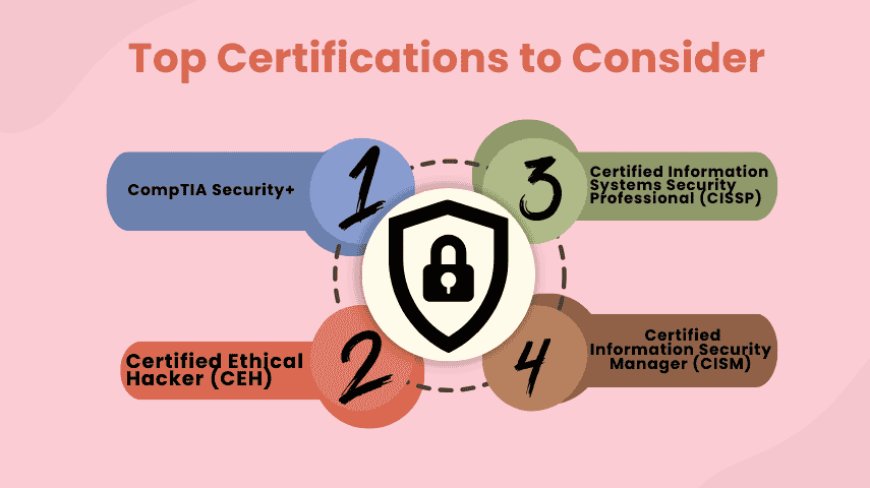Why Get a Cybersecurity Certification Today
Discover why earning a cybersecurity certification is a game-changer for your career. Explore the benefits, demand, and opportunities in this thriving industry. Start your journey today.

In a time when data breaches and online threats are becoming more common, cybersecurity skills are in high demand. Whether you’re a student exploring career options, an IT professional looking to specialize, or someone eager to protect their organization from cyber risks, a certification in cybersecurity can be a game-changer.This blog will explore the benefits of earning a cybersecurity certification, from boosting your career prospects to building confidence in handling digital security challenges. We’ll break it down step by step so you can decide if it’s the right move for you and how to get started. Let’s dive in and discover why investing in cybersecurity skills is a smart choice for your future.
The Rising Need for Cybersecurity Experts
-
Increase in Cyber Threats: Cyberattacks are becoming more frequent and sophisticated, targeting both large organizations and individuals. Hackers steal sensitive data like credit card details, personal information, and trade secrets. These breaches can lead to financial losses, legal issues, and a loss of trust among customers or clients.
-
Global Shortage of Professionals: The demand for cybersecurity professionals has outpaced the supply, creating a significant skills gap. Many companies struggle to find trained individuals who can protect their systems from attacks, leaving critical systems and data at risk. This shortage is creating opportunities for those willing to step into this field.
-
High Stakes for Businesses: For companies, protecting sensitive data isn’t just important—it’s necessary to survive in the modern economy. Businesses face heavy penalties for failing to protect user data and risk losing their reputation if a breach occurs. Hiring qualified cybersecurity experts ensures systems are secure and risks are minimized.
-
Career Opportunities: The need for cybersecurity professionals is creating a growing job market with competitive salaries and long-term growth potential. As threats increase, organizations in every industry are looking for skilled experts, making it a great field for those looking to build a career or switch to a stable and impactful role.
What Is a Cybersecurity Certification?
A cybersecurity certification is a professional credential that proves you have the skills and knowledge needed to protect networks, systems, and data from cyber threats. These certifications are designed to validate your understanding of security concepts, tools, and practices, making you a reliable candidate for roles in cybersecurity.
Types of Cybersecurity Certifications
There are many certifications available, each focusing on different aspects of cybersecurity. Some popular ones include:
-
CompTIA Security+: Ideal for beginners, covering basic security concepts and practices.
-
CISSP (Certified Information Systems Security Professional): Designed for experienced professionals, focusing on advanced security and risk management.
-
CEH (Certified Ethical Hacker): Teaches how to identify and fix vulnerabilities using ethical hacking techniques.
-
CISM (Certified Information Security Manager): Focuses on managing and overseeing security programs within an organization.
These certifications provide structured learning paths and are highly valued by employers, helping you build a strong foundation or advance your career in cybersecurity.
Benefits of Getting a Cybersecurity Certification
1. Career Advancement
A cybersecurity certification can help you qualify for new job opportunities. Many employers look for certified professionals to fill roles such as security analysts, ethical hackers, or IT security managers. It shows that you have the skills needed to tackle real-world challenges.
2. Higher Salaries
Certifications often lead to better-paying roles. For example, positions like Certified Ethical Hacker (CEH) or Certified Information Systems Security Professional (CISSP) typically offer higher salaries compared to uncertified roles. Employers value certified professionals because they bring specialized knowledge to the table.
3. Credibility and Recognition
Earning a certification demonstrates your commitment to cybersecurity and proves you have a solid understanding of the field. This credibility can set you apart from others when applying for jobs or working on important projects.
4. Skill Validation
Cybersecurity certifications ensure your skills are up to date with current threats and technologies. They test your knowledge of modern tools, best practices, and industry standards, helping you stay relevant in this constantly evolving field.
5. Networking Opportunities
Joining a certification program often connects you with a community of other professionals. Organizations like (ISC)² and CompTIA host events, webinars, and forums where you can share knowledge, find mentors, or discover new job opportunities.
Getting certified not only helps you grow your career but also equips you with the skills to tackle cybersecurity challenges effectively.
Top Certifications to Consider

If you’re considering a career in cybersecurity, here are some certifications to help you start or advance your journey, along with their focus areas and career paths:
1. CompTIA Security+
-
Who It’s For: Beginners entering the cybersecurity field.
-
Focus: Covers basic security concepts, risk management, and tools.
-
Career Paths: Security Analyst, Network Administrator, or IT Support Specialist.
-
Prerequisites: None, but some IT experience is helpful.
2. Certified Information Systems Security Professional (CISSP)
-
Who It’s For: Experienced professionals seeking advanced knowledge.
-
Focus: Advanced security topics like risk management, compliance, and system architecture.
-
Career Paths: Security Architect, IT Director, or Chief Information Security Officer (CISO).
-
Prerequisites: At least 5 years of paid work experience in information security.
3. Certified Ethical Hacker (CEH)
-
Who It’s For: Those interested in penetration testing and ethical hacking.
-
Focus: Identifying and fixing vulnerabilities using tools and techniques hackers use.
-
Career Paths: Penetration Tester, Vulnerability Analyst, or Security Consultant.
-
Prerequisites: Some experience in networking or security is recommended.
4. Certified Information Security Manager (CISM)
-
Who It’s For: Professionals aiming for management or leadership roles.
-
Focus: Managing security programs, policies, and risk.
-
Career Paths: IT Security Manager, Risk Manager, or Security Consultant.
-
Prerequisites: At least 5 years of experience in information security management.
These certifications cater to different skill levels and career goals. Choose one based on your current experience and the type of cybersecurity role you want to pursue.
How Cybersecurity Certifications Impact Your Career
1. Real-Life Success Stories
Professionals with certifications often find their careers advancing faster. For instance:
-
A network administrator with a CompTIA Security+ certification landed a cybersecurity analyst role, earning a higher salary and gaining more responsibilities.
-
A CISSP-certified professional transitioned to a management position, overseeing an organization’s entire security strategy.
2. Employers’ Preference for Certified Candidates
Many employers prioritize candidates with certifications, as it proves they have the skills and knowledge to handle cybersecurity challenges. Certifications like CEH or CISM are often listed as requirements in job descriptions, giving certified professionals an advantage.
3. Boosting Your Resume
Adding a recognized certification to your resume immediately makes you stand out. It shows commitment to your career and expertise in specific areas, making hiring managers more likely to choose you over uncertified applicants.
Financial and Time Investment
-
Cost: Entry-level certifications like Security+ cost high, while advanced ones like CISSP can be more high.
-
Time: Beginners may need 2-3 months to prepare for basic certifications; advanced ones may take 4-6 months.
The investment in certifications pays off through better job opportunities and increased earning potential.
-
Free study resources, practice exams, and online communities can help reduce costs while preparing effectively.
Investing time and money into cybersecurity certifications can lead to higher salaries, better job prospects, and faster career growth.
Learning and Growth Opportunities
-
Staying Updated with Trends: Certifications ensure you learn the latest tools, techniques, and strategies to handle emerging threats. This keeps your skills relevant in a fast-changing field.
-
Continuous Professional Development (CPD): Many certifications require ongoing learning to maintain your credential, encouraging you to attend workshops, webinars, and training programs.
-
Specialized Certifications: For those interested in niche areas, certifications like AWS Certified Security for cloud security or IoT Security Practitioner allow you to focus on specific technologies or sectors.
Overcoming Challenges
-
Technical Nature of Cybersecurity: For beginners, the technical aspects can seem complex. Start with foundational certifications like CompTIA Security+ to build a strong base before moving to advanced ones.
-
Balancing Study and Life: Create a study schedule that fits around work and personal life. Use online courses or self-paced learning tools to manage time effectively.
-
Choosing the Right Certification: Consider your career goals. If you’re new, start with general certifications like Security+. For management roles, opt for CISM, and for hands-on roles, CEH may be a better fit.
With the right mindset and planning, certifications can be a rewarding step in your cybersecurity journey.
Tips for Successfully Earning a Cybersecurity Certification
-
Understand the Requirements: Before starting, research the certification you want. Know the exam topics, prerequisites, and costs.
-
Use Study Resources: Study guides, online courses, and practice exams are essential tools to prepare effectively. Platforms like Udemy, Coursera, or official certification providers often offer materials.
-
Join Study Groups: Forums and groups (like Reddit or LinkedIn communities) can provide valuable insights, tips, and motivation from others working toward the same certification.
-
Create a Study Plan: Break your preparation into smaller milestones. Allocate time for each topic, and stick to a schedule that works with your daily routine.
The Future of Cybersecurity and Certification
-
Emerging Fields: Cybersecurity is expanding into new areas like AI security, blockchain, and quantum cryptography, opening up opportunities for specialized certifications.
-
Staying Relevant: Certifications help professionals keep up with changes in technology and threats, ensuring they remain valuable in the job market.
-
Long-Term Benefits: Continuous learning through certifications not only enhances your skills but also boosts your career prospects, leading to higher-paying and more secure roles.
With a clear plan and commitment, earning a certification can be your gateway to a rewarding career in cybersecurity.
Cybersecurity certifications are a powerful way to grow your career, stay updated with the latest security trends, and stand out in a competitive job market. From improving your skills to unlocking better job opportunities and higher salaries, the benefits are clear.
Now is the perfect time to start your journey. Explore certification programs that match your goals and take the first step toward building a stronger future in cybersecurity. Consider programs like those offered by IIFIS (International Institute for Information Security) for expert guidance and support. Your investment in learning today can shape a rewarding career tomorrow.
























